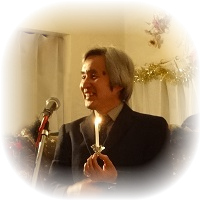↓Audio link to the sermon:(1st worship recording)
(If you can’t listen on your iPhone, please update your iOS)
The book opens in chapter 1 verse 1 by giving Habakkuk the title of prophet. So perhaps he was employed as prophet in the temple or the palace. If so, he would have been in the presence of the king and other leaders, and his work was to inquire of God during important decisions. What is different about the book of Habakkuk is that, instead of being mainly a record of God’s words to his people, it mainly contains Habakkuk’s questions to God in prayer, followed by God’s answer.
The most well-known part of this book is chapter 2 verse 4: “But the righteous person will live by faith.” It is one of the well-known verses of the Old Testament; and it is quoted 3 times in the New Testament: Romans 1:17, Hebrews 10:38, and Galatians 3:11. What this verse in Habakkuk actually says is that the righteous person is not a perfect person. As the book of Romans says, a righteous person is a person whose sins have been forgiven and who is justified by faith. A person who is in the process of being saved by this faith lives their daily life trying to imitate Christ and looks forward to their salvation being completed in the future. I think this is how we can define righteousness and salvation. “But the righteous person will live by faith.” So with this verse as our main theme for today, let us study the book of Habakkuk.
First, let’s look at the setting. At the time, prophet Isaiah served under King Josiah. He supported the king’s efforts to carry out religious reforms in the country. But after Josiah’s death, the king’s sons returned to idol worship. The world was changing so much, just like our world today. It’s hard to believe that today, in the 21st century, we are seeing all these wars and acts of terrorism. The kingdom of Judah in Habakkuk’s time was also undergoing such violent upheavals. Assyria was destroyed by Babylon, and even Egypt was defeated by Babylon.
In the midst of this, the leaders of Judah were surely shaken by these world events. Habakkuk must have been questioning God: Would God really allow Babylon to destroy Judah too? Would God let his chosen people fall to these ruthless pagans? How is God being righteous or just in this situation? That was the conflict in Habakkuk’s mind. And he expressed those thoughts before God in prayer. Habakkuk’s walk of faith was to keep continuing a conversation with God and to accept God’s will.
We will now read some verses from Habakkuk.
Chapter 1 verses 2 to 4 are Habakkuk’s words to God. He describes the reality in Judah, of assault and atrocities, struggle and strife. Verse 2 says, “How long, Lord, must I call for help, but you do not listen? Or cry out to you, ‘Violence!’ but you do not save?” Habakkuk asks when God’s will and God’s justice will come to Judah; and the answer is in verses 5 to 11.
God answers: You may not believe it, but it is my will to use the Babylonians as an instrument of judgment on Judah. In the second half of verse 5, God says, “For I am going to do something in your days that you would not believe, even if you were told.” This is God using the Babylonians to destroy Judah. Habakkuk is praying for justice, but the reality is that this will happen to Judah. Verse 7 says, “They are a feared and dreaded people;
they are a law to themselves and promote their own honor.” And God is allowing these Babylonians to dominate other nations.
From verse 12, we come across something interesting: “Lord, are you not from everlasting? My God, my Holy One, we will never die.” Habakkuk believes that God will not completely destroy his people even if his judgment is severe. Next, the second half of verse 13 says, “Why are you silent while the wicked swallow up those more righteous than themselves?” The next few verses describe God’s people as fish caught in a net. The one catching them is Babylon, proud and boastful; he worships his net, that is, he worships power.
Then in chapter 2, we see Habakkuk waiting to hear God’s reply. Chapter 2 verse 1: “I will stand at my watch and station myself on the ramparts; I will look to see what he will say to me, and what answer I am to give to this complaint.” As a watchman and prophet, he awaits God’s reply. And God answers. Verse 2: “Then the Lord replied: ‘Write down the revelation’”. Verse 3: “For the revelation awaits an appointed time; it speaks of the end and will not prove false. Though it linger, wait for it; it will certainly come and will not delay.” And the revelation, in verses 5 to 20, is that Babylon too will meet God’s judgment.
Like in Habakkuk’s time, today we are witnessing assault and atrocities, struggle and strife. But God’s righteous judgment will surely come. May we have faith in that. We see upheavals in society, caused by the words and actions of political leaders. In the midst of that, we must continue to love God and love our neighbors as ourselves. To forgive others with the love of Christ. The Lord will hold accountable leaders who act selfishly or for their own glory. The book of Habakkuk tells us how we should live: “But the righteous person will live by faith.”
The book of Hebrews says this about faith, in Hebrews 11:1: “Now faith is confidence in what we hope for and assurance about what we do not see.” We are to have confidence in the things we hope for, even the things we cannot see. The book of Hebrews gives the man called Abraham as one example of such faith from the Old Testament. Hebrews 11:8: “By faith Abraham, when called to go to a place he would later receive as his inheritance, obeyed and went, even though he did not know where he was going.” Going somewhere God calls you, even if you don’t know where it finally leads, is a faith decision. As another example, Hebrews mentions Abraham’s wife Sarah. Verse 11: “And by faith even Sarah, who was past childbearing age, was enabled to bear children because she considered him faithful who had made the promise.” Sarah considered that God could be trusted. Verse 6 says, “And without faith it is impossible to please God, because anyone who comes to him must believe that he exists and that he rewards those who earnestly seek him.” We believe that he does exist, and that he rewards those who earnestly seek him.
How do we live out our faith in this society? We will continue to think about this next Sunday. As believers, we put our faith in Christ and live accordingly. Christ has given us the Holy Spirit. He lives with us, through the Holy Spirit. Christ lives with you. Let us live with an awareness of that. God’s help is always available to us in difficult times. We remind ourselves, “God is watching over me.” Let us come to God with reverence and awe, and ask that he help us grow and mature until he takes us to be with him in heaven.
(If you can’t hear from the bar above, click the blue button)
iPhone





 日本語
日本語